
The People’s Republic of China is the most populous country in the world and its second-largest economy. Despite the economic transformation of recent decades there remains a huge disparity between urban and rural areas and the economic boom has led to serious environmental degradation and heavily polluted cities. China’s military power and international influence have also grown hugely in recent years.
The head of state is President Xi Jinping, who is also General Secretary of the Chinese Communist Party (CCP). Since the Communist revolution in 1949 the CCP has maintained strict control, cracking down on any signs of opposition and sending dissidents to labour camps. Human rights groups criticise China for executing hundreds of people every year and for failing to stop torture.
The CCP has long repressed religious freedom and all religions have suffered in recent years, particularly Uighur Muslims, Tibetan Buddhists and Falun Gong practitioners, but some observers describe the current situation as the worst since Chairman Mao’s Cultural Revolution (1966-76).
Christians in China
The Chinese constitution states that “Citizens of the People’s Republic of China enjoy freedom of religious belief” (Article 36), but in practice the state only recognises five religions (Protestantism, Catholicism, Buddhism, Taoism and Islam) and controls each by a state-sanctioned patriotic religious association. All five are regulated and strictly controlled by the State Administration for Religious Affairs, which was an organ of the CCP’s Central Committee until 2018, when it became a sub-department of the CCP’s United Front Work Department.
Protestantism is regulated through the Three-Self Patriotic Movement (TSPM), so named because the objective of the movement is that Chinese churches become independent of foreign missions by being self-supporting, self-governing and self-propagating. Catholicism is regulated through the Chinese Catholic Patriotic Association (CCPA), set up to be independent of the Vatican because the Communist Party did not want Chinese people to follow a foreign leader, the Pope. The practice of other faiths is officially prohibited but often tolerated, especially traditional Chinese beliefs.
During the Cultural Revolution even the officially-recognised groups were banned and all religious activity was forced underground. The house church movement grew enormously and thousands of pastors were persecuted. At the end of 1970s China began to reform, restrictions eased and the TSPM and CCPA re-emerged.
While reliable statistics are impossible to obtain, it is estimated that there are over 100 million Christians in China: 20 million members in the TSPM; at least 70 million in unregistered house churches; 6 million in the CCPA; and 12 million “underground” Roman Catholics. Under a 2018 deal with the Vatican, criticised by Catholics worldwide and since renewed, the Chinese government nominates bishops who are then confirmed by the Vatican.
Sinicisation campaign
In recent years the Communist Party has increased its efforts to “sinicise” religion (make it Chinese in character and bring it into submission under the Chinese Communist Party) and force all local churches to register with the TSPM or CCPA. A “Five-Year Work Plan To Further Advance The Sinicisation of Christianity (2023-2027)” was introduced in January 2023.
Registered churches are very tightly controlled and must sing patriotic songs, fly the national flag, put up portraits of the president, install surveillance cameras, display quotes from the president’s speeches extolling “core socialist values” and listen to pro-CCP sermons. Their leaders are appointed by the CCP and approval is needed to hold additional meetings, invite visiting speakers, change the leadership or engage in any activities outside the church building. Evangelism is forbidden and under-18s may not attend.
The majority of Chinese Christians choose not to attend heavily-regulated registered churches, preferring the independent churches that have become known as house churches because most started as small, secret groups in homes. Many are now so big that they rent space in offices and restaurants – these big urban groups are sometimes known as the “third church”, distinct from registered churches and rural house churches.
Under the sinicisation campaign crosses have been torn down, churches closed and some buildings demolished. Many church leaders have suffered harassment, heavy fines, arrest and torture and members of unregistered churches have been harassed and discriminated against in employment, housing and business. The degree of persecution varies according to location and the attitude of local officials, but increasingly the government is also cracking down on TSPM churches, prompted by concerns about the size or prominence of church buildings.
New religious regulations
The sinicisation campaign has been facilitated by the introduction of a series of several sets of religious regulations, beginning in 2018, which have increased the authorities’ control over all religious practice in China.
The controversial “Revised Regulations for Religious Affairs” that came into force on 1 February 2018 were followed by several sets of restrictive measures: the “Administrative Measures for Religious Groups” (which came into effect on 1 February 2020); “Administrative Measures for Religious Clergy” (1 May 2021); “Administrative Measures for Religious Institutions” (1 September 2021); “Measures for the Administration of Internet Religious Information Service” (1 March 2022); “Administrative Measures for Financial Affairs of Religious Premises” (1 June 2022); and “Administrative Measures for Religious Activity Venues” (1 September 2023).
These regulations and administrative measures impose strict controls on church administration and content of services, ban under-18s from church, make it increasingly difficult to obtain Bibles and forbid the posting of any religious material online without a licence. Churches must support the CCP leadership and “adhere to the direction of sinicisation of religions“.
New “Measures to Ban Illegal Social Organisations” (issued by the Ministry of Civil Affairs of China on 13 February 2025, to come into effect on 1 May 2025) consist of 23 articles which religious analysts are concerned may be used to target unregistered house churches and underground Catholic churches that refuse to join the official Chinese Catholic patriotic association. China Aid stated, “The new law could intensify persecution against clergy and believers who refuse to register with government authorities.”
Bibles
The Chinese government permits Bibles to be printed by the Amity Press in Nanjing, and there has been a huge increase in the number available in recent years. Amity Press has printed tens of millions of Bibles, for use by TSPM and CCPA churches and for export. However, there are still not nearly enough Bibles to supply all the Christians in house churches, especially in rural areas, where house churches are growing fast.
In April 2018 the government banned the online sale of Bibles in China, and on 1 May 2021 the Bible App was removed from the App Store in China.
(Asia Harvest, BBC, China Aid Association, Christianity Today, CNN, Compass Direct News, International Christian Concern, Operation World, Wall Street Journal, Wikipedia)
Church in Chains in Action
For many years, Church in Chains has called for greater religious freedom in China, has sought to support house church Christians facing harassment and restrictions and has campaigned on behalf of individual prisoners and churches.
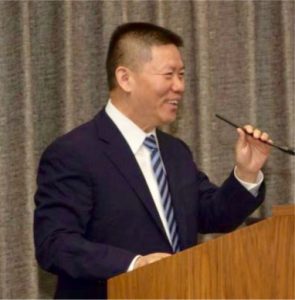 In September 2019, Dr Bob Fu, founder of partner organisation China Aid, visited Ireland to speak at Church in Chains’ annual conference in Dublin. During his visit, Dr Fu also launched Church in Chains’ China Report at Buswells Hotel, Dublin.
In September 2019, Dr Bob Fu, founder of partner organisation China Aid, visited Ireland to speak at Church in Chains’ annual conference in Dublin. During his visit, Dr Fu also launched Church in Chains’ China Report at Buswells Hotel, Dublin.
In 2016, Church in Chains organised a postcard campaign (pictured) calling for the release of Bao Guohua and Xing Wenxiang, 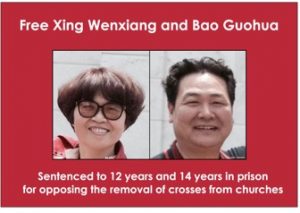 two pastors given long prison sentences for opposing the removal of church crosses.
two pastors given long prison sentences for opposing the removal of church crosses.
In 2011, Church in Chains organised a postcard campaign from Irish Christians to the Mayor of Beijing calling for an end to the harassment of Shouwang Church. Also in 2011, Bob Fu spoke at Church in Chains’ annual conference in Athlone.
In 2008, Church in Chains presented a petition from Irish Christians to the Chinese Embassy in Ireland calling on the Chinese government to respect and implement its obligations to provide genuine freedom of religion for all.
Church in Chains has sponsored the sending of thousands of Bibles and Christian books to Christians in China via partner organisations.
CHINA: Wang Honglan’s verdict made public
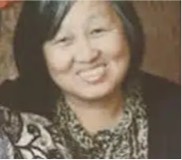
The 70-year-old grandmother was sentenced to four years and ten months in prison.
CHINA: Bob Fu writes about “Beijing’s Bullies”
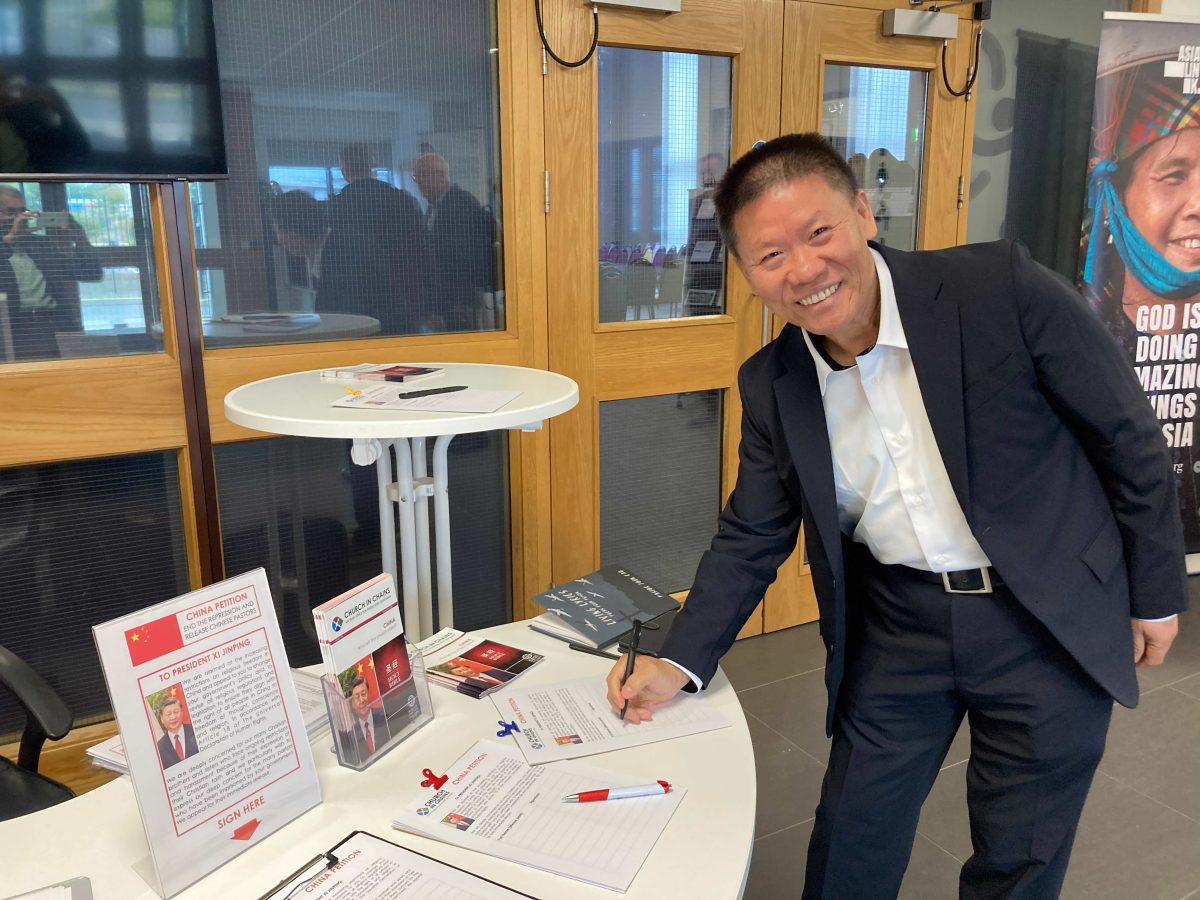
Campaign of threats and intimidation against him, his family and China Aid
CHINA: Pastor Wan Changchun sentenced to five years in prison

The pastor of Cornerstone Reformed Church in Bengbu was arrested in April 2023 and has been in detention since.
CHINA: Five Shengjia Church leaders sentenced for “illegal business operations”
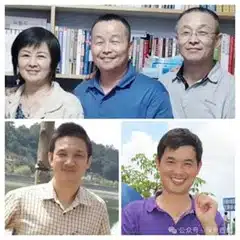
Preacher Deng Yanxiang and four co-workers from Shengjia Church in Guangdong province have been sentenced for “illegal business operations”
CHINA: Preacher Chang Hao questioned and intimidated after release
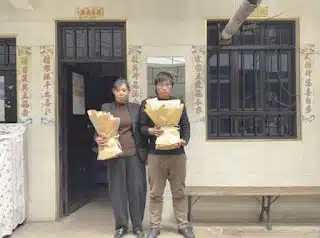
Chang Hao was released on 27 October after twelve days’s detention but was taken for questioning before being allowed home
